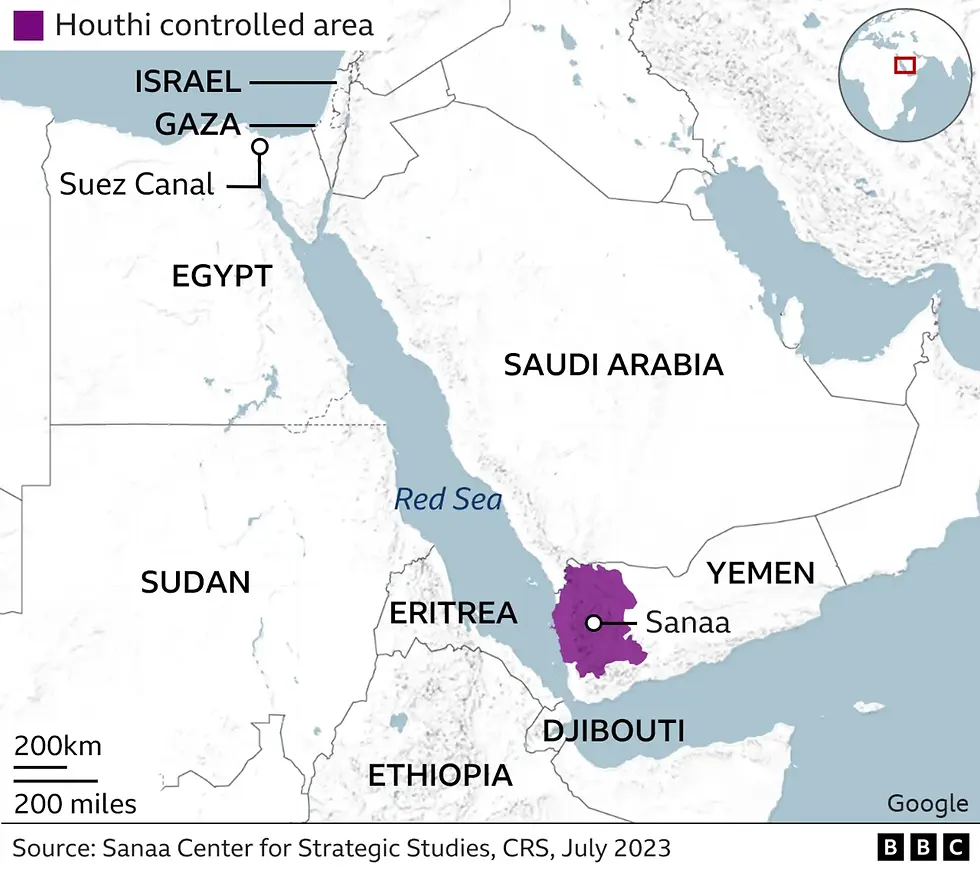The Barbary pirates
- Joe

- Feb 29, 2024
- 3 min read
Updated: Mar 2, 2024
The ongoing war in Gaza is not the only major event currently on-going in the Middle East. As a direct result of the war the Houthis, a Iran-supported Islamist group that controls a chunk of the country of Yemen, have been harassing shipping in the Red Sea, which connects to the Suez Canal. Ships have been attacked with missiles and drones, even hijacked. Shipping companies are deciding to avoid the Red Sea and the Suez entirely, going instead all the way around Africa. It's a real problem for trade considering its important location, much like when the Ever Given got stuck, in addition to the people actually getting attacked. The big difference this time is it's terrorists. The U.S. military has struck back at the Houthis (though we've frequently done stupid things like telling the Houthis in advance when we're going to respond), and hopefully this doesn't become a long-term issue.
What it's reminding me of, however, is a saga in American history you probably learned about in school. Piracy in the Mediterranean Sea, along the (north) Barbary Coast of Africa, was also a pressing matter around the time the United States became a country, and for a few hundred years beforehand. In fact, the Barbary pirates are the reason the U.S. Navy was created in 1794. During this period the United States was more-or-less blackmailed into paying large sums ('tributes') or risk ships flying our flag be attacked at sea. It was not a state of affairs that would last long.
In 1801, soon after Thomas Jefferson was inaugurated as President, the leader of Tripoli (a semi-autonomous part of the Ottoman Empire) demanded a new tribute from the United States. Jefferson refused, he'd been arguing against paying the pirates since his time as Minister to France and believed it only encouraged further piracy. This kicked off the First Barbary War and Jefferson immediately sent ships and men to the Mediterranean. He gave careful instructions to only defend American ships from attack and asked Congress to grant proper authority to wage war. This happened the next year, in 1802, and soon afterward there was a wide-scale blockade of the Barbary ports. The war lasted until 1805 when Tripoli sued for peace, with the two sides exchanging prisoners and the U.S. paying ransom money. Even if it wasn't a full, outright victory, the United States military proved for the first time it could fight effectively on the other side of the world. It was also some of the first action for the newly created U.S. Navy and the Marine Corp, created by Congress as its own branch in 1798. This is why the Marines' Hymn sings of the 'shores of Tripoli.'
What amuses me most about this whole ordeal is it was Thomas Jefferson who was behind it. Jefferson's ideology decried the national, centralized government, stressing the importance of individual liberty and keeping power vested in the states. It warned against a standing military and far-flung adventurism. And yet he started building the navy and precipitated this foreign war. Plus he'd complete the Louisiana Purchase, at-the-time constitutionally dubious. Before Jefferson's election leading Federalists like Adams and Hamilton (admittedly rabid partisans) feared he'd weaken and effectively and destroy the new government, not expand its reach. How he acted as President is a big part of his enigma and why he's such a fascinating man to study.
The current issues with the Houthis in the Red Sea have a lot of similarities with the time of the Barbary pirates. We literally founded our navy to protect commercial trade, and it was even a man who wasn't a true believer in the power of the Federal government who did it. We should have no qualms about continuing to do so today.
What he said.







Comments